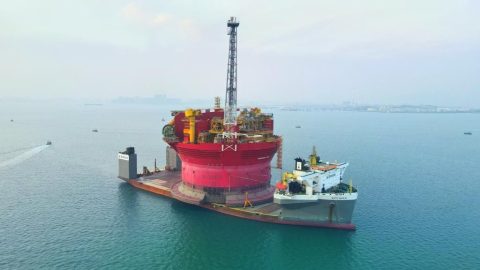
Boskalis White Marlin sets off from China with Shell Penguins FPSO
Boskalis’ semi-submersible transport vessel White Marlin has set off on a journey from China to Norway with a highly impressive cargo onboard, a 34,0000-ton floating production, storage and offloading (FPSO) unit.
White Marlin departed from Qingdao, China with the cylinder-shaped Shell Penguins FPSO following the completion of a float-on and seafastening campaign.
Photos show a penguins cylindrical floating production, storage and offloading (FPSO) device at its delivery ceremony in Qingdao, east China’s Shandong Province. A 118-meter-tall FPSO made by the Offshore Oil Engineering Co., Ltd. for a British client was successfully delivered. pic.twitter.com/rx73VscQKK
— China Focus (@China__Focus) November 30, 2022
China Offshore Oil Engineering Company (COOEC) completed the construction of the FPSO and delivered the unit to Shell at the end of last month, noting that it is “the largest and most intelligent new cylindrical FPSO built by a Chinese company so far.”
Penguin FPSO has an oil storage capacity of 400,000 barrels, a crude oil processing capacity of 12.75 million barrels per year, and a natural gas processing capacity of 1.24 billion cubic meters per year. The diameter of the double bottom of the hull is 87.5 meters, the total weight is about 32,000 tons, and the total operating weight is 88,000 tons, COOEC said.
In January 2018 Shell took the final investment decision to redevelop the Penguins oil and gas field in the UK North Sea using a floating production, storage and offloading vessel.
The Penguins field, located northeast of the Shetland Islands in the UK North Sea, was discovered in 1974 and first developed in 2002. At that time oil and gas were pumped from four drill centres that were tied back to the Brent Charlie platform in the nearby Brent field.
In 2017, after over forty years of successful operation, Shell started the process of decommissioning the Brent Field, including the Brent Charlie platform. In 2018 Shell took the final investment decision to redevelop the Penguins oil and gas field in the UK North Sea using a floating production, storage and offloading (FPSO) vessel that would take the place of the Brent Charlie platform.
As part of the redevelopment process a further eight wells will be drilled and tied back to the FPSO vessel. Oil will be transported via tanker to refineries, and gas will be transported via the Far North Liquids and Associated Gas System (FLAGS) pipeline to the St Fergus gas terminal in northeast Scotland, Shell says.
You just read one of our premium articles free of charge
Want full access? Take advantage of our exclusive offer




